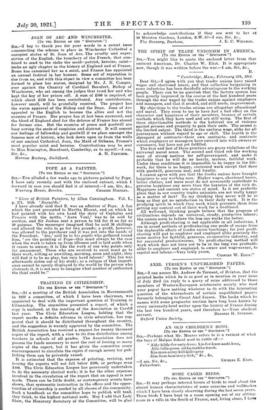THE SPIRIT OF TRADE UNIONISM IN AMERICA. [To THE EDITOR
Or THE "SPECTATOR."] STR,—You might like to quote the enclosed letter from that eminent American, Dr. Charles W. Eliot. It is appropriate now, though it was written before the war.—I am, Sir, &c.,
B.
" Cambridge, Mass., February 5th, 1911. Dear Sir,—I agree with you that trades unions have raised wages and shortened hours, and that collective bargaining in some industries has been decidedly advantageous to the working people. There can be no question -that the factory system has been greatly improved in the course of the last hundred years through the war waged by the trades unions against employers and managers, and that it needed, and still needs, improvement. My objections to the trades unions are altogether educational and moral. They seem to me to have had a bad effect on the character and happiness of their members, because of certain methods which they have used and are still using. The first of these objectionable methods is the habitual use of violence against persons and property to gain their ends. The second is the limited output. The third is the uniform wage, alike for all journeymen without regard to age or skill. The fourth is the disregard of contracts—their own contracts, and contracts which employers or managers have entered into with owners or consumers, but have not yet fulfilled.
The first and last of these practices are grave violations of the universal moral sense. The second and third rob the working man of strong motives for self-government, and make it probable that he will do no hearty, zealous, faithful work. Under these conditions it is impossible to be happy in the life- work, for there is no happy, contented work except that done with goodwill, generous zeal, and loyalty.
I cannot agree with you that the trades unions have brought happiness to any working men. Higher wages, shortened hours, better clothes, and more meat do not necessarily contribute to genuine happiness any more than the luxuries of the rich do. Happiness and content are states of mind. Is it not perfectly plain that in our country trades unionists are not really happy as a matter of fact? To my thinking they never will be so long as they get no satisfaction in their daily work. It is the grudging spirit in which they work which prevents them from getting any content out of their work for a livelihood.
All well-read, thinking people believe that the progress of civilizations depends on universal, steady, productive labour; the unions seem to believe the less one works the better.
Although profit-sharing is not applicable in all industries, I see in sound methods of profit-sharing one mode of escape from the deplorable effects of trades union teachings; for just profit- sharing will put to employer and employed alike precisely the same motive for faithful, generous, co-operative industry, and for successful productiveness. No profit-sharing method will work which does not turn out to be in the long run profitable alike to employer and employed, to owner and wage-earner, to capital and labour.—Very truly yours,
CHARLES W. ELIOT."


































 Previous page
Previous page